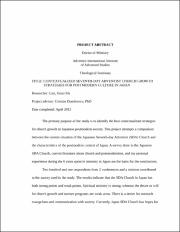| dc.description.abstract | The primary purpose of the study is to identify the best contextualized strategies
for church growth in Japanese postmodern society. This project attempts a comparison
between the current situation of the Japanese Seventh-day Adventist (SDA) Church and
the characteristics of the postmodern context of Japan. A survey done in the Japanese
SDA Church, current literature about church and postmodernism, and my personal
experience during the 6 years spent in ministry in Japan are the basis for the conclusions.
Two hundred and one respondents from 2 conferences and a mission contributed
to the survey used in the study. The results indicate that the SDA Church in Japan has
both strong points and weak points. Spiritual ministry is strong, whereas the desire or will
for church growth and nurture programs are weak areas. There is a desire for outreach
evangelism and communication with society. Currently, Japan SDA Church has hopes for
growth based on healthy relationships, Bible study, significant presence of children and
youth, small groups, good pastoral leadership, and good church image. Most respondents
indicated their awareness about postmodern behaviour and an understanding of the
postmodern characteristics challenging the SDA Church in Japan, such as
globalization/internationalization, particularism/universalism, self-divination,
democratization, consumerism, therapy, and spiritualism.
The conclusion of the study recommends that the SDA Church in Japan becomes
a postmodern-sensitive church/community as one of the keys to church growth in a
postmodern context. In order to establish an effective ministry in a culture of
postmodernity, strategies were suggested as follows: religious (transforming into biblical
worldview, storytelling, modelling of lifestyle, experiential principle, proper using the
concept of God), cultural (media/internet, multi-worship, customizing evangelism, SDA
calendar-evangelism, image-driven church), social (globalization cooperation, glocality
principle, oikos, urban centered mission), anthropological (cell ministry, friendship,
partnership, healthy ministry), and changing paradigm (cultivating professional lay
ministry, youth evangelism).
Moreover, an all-encompassing model that includes both the personal and public
dimensions of inreach and outreach are required in order to propagate a genuine Christian
character to postmoderns via the models of incarnated truth, unaffected friendship, and
individual experience of the Gospel. | en_US |

